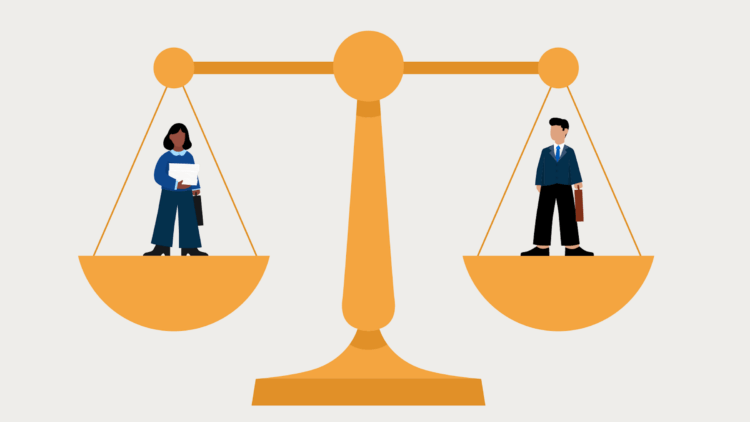One of my first projects as a lawyer was to draft a Motion to Shorten Time.
I panicked. This was definitely not covered in law school. In hindsight, I should’ve asked for more instructions but, not wanting to look foolish, I left the partner’s office without asking a single question.
It took me over a week to draft the motion. After a lot of research and cramming I finally figured out what Motion to Shorten Time was, how it worked, and the applicable rules. When I handed it to him, he smiled and said, “it’s called motion to shorten time.”
Law school prepares you for a lot, but there’s plenty more to do with the actual practice of law that law school just doesn’t cover.
Here are some other things that schools should teach young lawyers about in law school—and that you should be learning about yourself in the meantime.
1. How to listen
In law school, students are trained to listen in order to run legal analysis—they gather the relevant facts, figure out the applicable rules, and use them to analyze those facts. They’re also taught to listen so they can respond or react as is necessary, for example, during an oral argument.
What they are not taught is to listen so that our clients feel truly heard and understood.
Often, when a client comes to see you, it’s probably the first time she’s ever shared her story with anyone. This was certainly true for my practice in consumer bankruptcy. The clients were deeply distressed and full of raw emotions. Many felt angry at themselves, their ex-business partners, their spouse, or at the world.
What I learned was that if I moved too quickly into “lawyer mode” and started asking detailed questions about the value of their assets, income, and amount of debt, the clients would often freeze. I wasn’t building empathy.
The clients deeply wanted to felt, heard, and seen.
Lawyers are in the trauma business. Rarely do clients come to see you with happy news. As lawyers, we need to acknowledge the trauma so that clients feel seen, heard, and understood.
This way of listening is useful in dealing with other people as well, including opposing counsel. Often, when I feel frustrated because she’s being unreasonable, I’ll notice my own emotional response to the situation. Rather than reacting from this place of anger and frustration, I’ll take a curious stance. Sometimes, I’ll ask her, “please help me understand your client’s position so I can explain it to my client.”
2. How to manage the unintended consequences of lawyering
According to a study published by the American Bar Association, 20.6% of lawyers screened positive for hazardous, harmful, and potentially alcohol-dependent drinking. Levels of depression, anxiety, and stress among attorneys were significant, with 28%, 19%, and 23% experiencing symptoms of depression, anxiety, and stress, respectively.
Why? Again, lawyers are in the trauma business, and it affects them too. According to one study, “almost 35 percent of public defenders meet the criteria for [secondary traumatic stress] STS and about 75 percent of those with STS symptoms meet the qualifications for functional impairment.”
It’s puzzling that despite these well-documented and well-studied consequences of lawyering, lawyers get zero training in law school on this issue.
Therapists who are also in the trauma business receive training on vicarious trauma, secondary traumatic stress, post-traumatic stress disorder, compassion fatigue, burnout, and other unintended consequences that can arise simply because they’re doing their job. They also receive training on strategies for avoiding and working with these potential consequences.
About the only “tool” law school offers is happy hour. Small wonder, then, that so many lawyers use alcohol and other substances to manage the stress, anxiety, depression, and burnout that can come with lawyering.
Learning about the unintended consequences of lawyering early on—and creating strategies for avoiding it, including self-care, mindfulness, emotional intelligence—is crucial for a successful legal career.
You may like these posts
3. How to nurture creativity
As discussed in this Harvard Business Review article, creativity is the most important skill a leader can have. Yet, “80% of American and British workers feel pressured into being productive rather than creative.” This is also true for lawyers.
Creativity is important because it’s the foundation for new ideas and solutions. Often, law school kills the creativity and curiosity that law students start 1L with. They stop reading for the fun of it, stop creating art, stop writing fiction pieces, stop dancing, stop doing yoga, etc.
Stare decisis also doesn’t help to inspire and spark creativity. You’re taught that there’s only one correct way to do things—to think in binary terms, and to see each case as a zero sum game.
When you’re engaged in a creative process, you can access a state known as “flow,” also sometimes known as ‘being in the zone.’ Mihaly Csikszentmihalyi is a researcher and author that studies this phenomenon. His book is Flow: The Psychology of Optimal Experience.
In his TED talk, Csikszentmihalyi describes flow in this way:
There’s this focus that, once it becomes intense, leads to a sense of ecstasy, a sense of clarity: you know exactly what you want to do from one moment to the other; you get immediate feedback. You know that what you need to do is possible to do, even though difficult, and sense of time disappears, you forget yourself, you feel part of something larger. And once the conditions are present, what you are doing becomes worth doing for its own sake.
A few years ago, I decided to return to the many hobbies I abandoned. I also picked up some new hobbies.
I started gardening, took beer-making classes, and started sewing and writing. What surprised me was that exercising my creative muscles helped me to think of creative solutions for my clients. Some of my best trial strategies have revealed themselves when I’m engaged in activities that allow me to access flow.
As our legal system becomes ever more complex, as more data and technology becomes available, it’s critical for lawyers to stay agile and nimble—and these skills can be cultivated and practiced through creativity.
I spoke with Jack Pringle, information technology attorney and partner at Adams and Reese LLP, about his thoughts on creativity. Here’s what he had to say:
Good lawyering involves finding solutions to difficult problems. The solutions are not immediately apparent, especially in these times of rapid change. Creativity (implementing new ideas based on seeing problems clearly) is crucial for problem-solving lawyers.
4. How to have a difficult conversation
I once had a client whose mother fell suddenly ill during her bankruptcy. If her mother died, leaving the will as-is, the bankruptcy estate would get all the inheritance. I suggested to her that she speak to her mother about changing the will.
The client was understandably upset, not wanting to worry her mother with her financial troubles. She felt ashamed and embarrassed.
I also felt a lot of tension and sadness. Every few days, the client would call, crying, upset, and asking me how she should go about asking her mother to change the will.
I had no easy answers.
As lawyers, you’ll likely hear stories you’ll never be able to unhear, and see images that you’ll never be able to unsee. This also means you may need to have very difficult—and sometimes, unthinkable—conversations with your clients. Learning how to meet your clients in their most vulnerable state, learning to meet their suffering with empathy and compassion—these are cornerstones that will help you manage difficult conversations.
5. When to use alternative methods to help clients
Abraham Maslow said, “I suppose it is tempting, if the only tool you have is a hammer, to treat everything as if it were a nail.”
Lawyers are trained to view every situation through the lens of lawyering, but we rarely pause to ask, “is the law an appropriate solution here?” For example, over the years, I’ve developed working relationships with financial advisors, CPAs, realtors, and therapists. Often, when clients come in to discuss bankruptcy, I recognize that while the client could file, that may not be the best solution.
Sometimes, the client has never learned personal finance skills so it may be more appropriate to refer her out to a financial advisor who can help to set up a budget and help her to repay her loans rather than file for bankruptcy. Other times, the client has been struggling with some type of addiction (e.g., gambling or drinking), which is at the center of his financial issues, so it’s more appropriate to send him out to see a therapist.
Having worked for many years in litigation, both as an assistant state attorney and as a civil litigator, I’ve learned that “winning” a litigation case rarely restores the client whole. Often, they’re still bitter because the underlying conflict remains unresolved. The client may still be bitter about the dispute she’s had with her business partner or her ex-spouse, for example. In these situations, a little compassion can go a long way. Having local professionals to refer your clients to (e.g., therapists or accountants) can help solve their problems more completely.
6. How (and why) to hone your conflict management skills
In law school, we are taught about the law and how to procedures necessary to navigate the legal system.
What we are not taught about is how to deal with the various personalities—the passive aggressive people, the yellers, the screamers, and the jerks. We’re not taught how to manage the discomfort that often accompanies conflict. Unless you’re fortunate enough to take a class on negotiations or something similar, there’s no training on how to de-escalate a conflict, how to find win-win solutions, or how to understand the needs of the other party.
One criminal defense attorney in my mindfulness course shared that he simply didn’t know how to not be a defense attorney at all times. His wife and child would often accuse him of treating them like clients or a hostile witnesses. We need tools for being able to manage conflicts at work effectively, as well as conflicts that can arise in our personal life.
As noted in a recent report released by the National Task Force on Lawyer Well-Being, “chronic, unmanaged conflict creates physical, psychological, and behavioral stress. Research suggests that conflict management training can reduce the negative stressful effects of conflict and possibly produce better, more productive lawyers.”
7. How to be resilient
There’s a growing body of research which suggests people have different capacities for bouncing back and surviving life’s difficulties and traumas. This ability to bounce back is known as resilience.
Fortunately, research also suggests that resilience is something you can learn—it’s not an innate skill.
According to the report mentioned above from the National Task Force on Lawyer Well-Being, factors that can enhance resilience include, optimism, confidence (self-efficacy), effective problem-solving skills, a sense of meaning and purpose, flexible thinking, impulse control, empathy, close relationships and social support, and faith or spirituality.
8. How to run a law practice
Law school teaches students about “the law,” but not how to make a living practicing it. There’s no class on how to get clients, on networking, or on the business end of running a law practice.
When my husband and I decided to quit our law firm jobs to start our law practice, I was surprised by how little I knew about the business of being a lawyer.
This is unfortunate. As much as lawyers like to think of themselves as professionals that frown upon having a frank conversation about how to build a financially successful practice, the reality is that the only way we’ll be able to continue to do our work is if it’s sustainable.
Law students would benefit from a foundational understanding of how a business works. Courses could include: accounting, economics, finance, management, marketing, and organizational behavior.
9. How to manage your personal finances
This is a topic that I believe should be taught much earlier on in the education system, but it’s especially negligent to skip personal finance education in or ahead of law school when young students are borrowing six-figures to finance a J.D.
A few years ago, I was asked to teach a law practice management course at a local law school. The dean thought it was necessary because so many students were opting to start their own law practice out of law school.
We began the semester by talking about personal finance—most importantly, by answering these questions:
- How are you going to build a sustainable law practice?
- How much do you need to generate to pay your overhead costs?
- How much money do you need to survive, and better yet, to thrive?
Surprisingly, very few students had an understanding of how much they would owe at graduation, what their monthly payments would be, or how much they would need to generate to pay them.
More law schools may consider offering courses like this in the future, but until then, law students can take matters into their own hands by taking out books on financial planning or following financial planning and business blogs while in law school.
For fresh ideas on getting your name out there and driving business, learn about how to get legal clients.
10. How to nurture an internal sense of success and self-worth
Most lawyers get to where they are because they are high achievers. Often, they’re at the top of their class. They’re successful, and they are driven.
These external yardsticks can be useful drivers, but when taken to an extreme, they can also can be toxic. When law students become used to looking externally for a sense of self-worth and satisfaction, it can become difficult to create those feelings from within.
I’ve worked and spoken with so many lawyers who feel as though they’re only as good or successful as their last win—they struggle with the sense of constantly failing. This expectation that we be perfect (a pressure which seemingly comes from every direction), in an environment that encourages aggression, can lead to chronic stress for many lawyers.
Dr. Kristin Neff argues that “[o]ur competitive culture tells us we need to be special and above average to feel good about ourselves, but we can’t all be above average at the same time.” She adds, “There is always someone richer, more attractive, or more successful than we are. And even when we do manage to feel self-esteem for one golden moment, we can’t hold on to it. Our sense of self-worth bounces around like a ping-pong ball, rising and falling in lock-step with our latest success or failure.”
It was a long journey for me to reorient my own internal compass for understanding where my priorities are and for feeling a sense of self-worth. Each and every one of us has an inherent self-worth and value—not because you’ve won that latest jury verdict, or appeal, but simply because it’s your right as a human being to be valued.
Meditate. Take time for self reflection. Keep a journal of things that went well every day. Whatever it takes, make time to improve your ability to create your sense of self worth internally. Lawyering is a tough career, and the more you can do to keep yourself resilient, the more successful (and healthy) you’ll be in the long term.
Preparing for success as a lawyer means preparing yourself in more ways than one
There’s more to being a lawyer than just practicing law. From managing finances, to dealing with the business side of law, to protecting your mental health, there’s a lot to consider for young lawyers wanting to set themselves up for long and successful legal careers.
The legal profession is a demanding one, but it is possible to have a balanced life and a fulfilling career—it just takes a bit of personal care and a lot of preparation. The more young lawyers prepare themselves for the multiple facets of a career in the legal industry, the better equipped they’ll be to not only help others, but to have rich, healthy professional lives themselves.
About Jeena
This post is by Jeena Cho, a Legal Mindfulness Strategist at Start Here HQ. She is the co-author of The Anxious Lawyer, a book written by lawyers for lawyers that makes mindfulness and meditation accessible and approachable. Jeena offers actionable change strategies for reducing stress and anxiety while increasing productivity, joy, and satisfaction through mindfulness.
We published this blog post in September 2017. Last updated: .
Categorized in: Business








